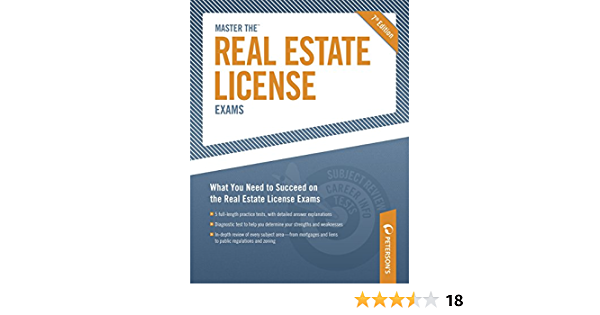
First, you must prepare for the exam in order to obtain an Illinois real-estate license. The state examination and pre-licensing courses are the two main parts of the exam. Both the state exam and pre-licensing coursework are required. For Illinois to be granted a real-estate license, the test must be taken at minimum three times. Failures on the test must be repeated in order to obtain a passing grade. The chances of success are higher if you study hard. Preparation courses can also be an option to aid you with your studies.
Pre-licensing course
To be eligible for a state-license exam in Illinois, candidates must complete pre-licensing coursework. This course can be completed in a variety of ways, including through an online learning environment or self-paced study. The online course consists of self-paced reading, videos, quizzes, and interactive sessions. For the state licensing exam candidates must achieve at least 80 percent on each quiz and module review.
The Illinois realty license is slightly different to those required in other states. Illinois brokers represent both buyers & sellers. The Illinois Department of Financial & Professional Regulation must approve at least 15 hours of practical practice-related coursework. The courses must be completed within six weeks of the beginning of the licensure process. If a student is enrolled in distance learning courses, their start date is the date they begin the course materials. It ends on the date that all documentation has been submitted.

Exam requirements
To become an Illinois real estate license, you will need to pass the state's licensing exam. This test is divided into two sections: the general portion and the Illinois specific section. Passing both sections requires a score of 75%. The exam can be repeated four times. The exam fee for $37. Online exam takers can opt for the $37 fee.
Before you can become a professional real estate agent, it is necessary to first associate with a broker. Once you have signed up, your sponsoring broker will send you paperwork to the state. Your real estate career can start immediately. The state will issue you a license and a wallet card. You can also use your Illinois real-estate license, if desired. If you fail the exam the first time, you can retake it as many times as necessary until you pass the exam the first time.
Cost
In Illinois, the total cost of an agent's license is $385 - $699. Other expenses may include fees for a real estate broker and REALTOR(r) membership. These costs can vary depending on the state and are separate to the initial cost for the license. Here are some additional costs associated with an agent license. A full list of all expenses is available on StateRequirement.com. Listed below are the most common expenses associated with an agent's license in Illinois.
The Illinois realty license application process is straightforward. To apply for a license, applicants must be at least 21 years old, have a high school diploma or GED, and have a Social Security or individual taxpayer identification number. Candidates between 18-21 must also show proof that four semesters have been completed in post-secondary studies. The exam is closed-book so applicants must have a basic-function calculator with them.

Reputability
Online courses are an option for many reasons. To practice in Illinois, you will need to pass the state licensing examination. It is important that you choose a program with an excellent reputation. Online courses that have been approved by IDFPR are the most popular and will provide all of the coursework required for your license. Also, it is important to find a school that has a strong reputation in order to pass the exam quicker.
While many online courses include pre-licensing and continuing education courses, these are not typically required for licensing. Depending on the state you live in, some online schools have a few restrictions that you should be aware of. One concern is that online courses aren’t as extensive as you require. These limitations are made worse because most online courses don’t offer live webinars with knowledgeable instructors. Not only are they limited in number, but also may have outdated content and few extras.
FAQ
Are flood insurance necessary?
Flood Insurance protects you from flooding damage. Flood insurance helps protect your belongings, and your mortgage payments. Find out more information on flood insurance.
What are the benefits of a fixed-rate mortgage?
Fixed-rate mortgages allow you to lock in the interest rate throughout the loan's term. This ensures that you don't have to worry if interest rates rise. Fixed-rate loan payments have lower interest rates because they are fixed for a certain term.
How many times do I have to refinance my loan?
This depends on whether you are refinancing with another lender or using a mortgage broker. You can typically refinance once every five year in either case.
Statistics
- Private mortgage insurance may be required for conventional loans when the borrower puts less than 20% down.4 FHA loans are mortgage loans issued by private lenders and backed by the federal government. (investopedia.com)
- 10 years ago, homeownership was nearly 70%. (fortunebuilders.com)
- Based on your credit scores and other financial details, your lender offers you a 3.5% interest rate on loan. (investopedia.com)
- This seems to be a more popular trend as the U.S. Census Bureau reports the homeownership rate was around 65% last year. (fortunebuilders.com)
- Some experts hypothesize that rates will hit five percent by the second half of 2018, but there has been no official confirmation one way or the other. (fortunebuilders.com)
External Links
How To
How to manage a rental property
While renting your home can make you extra money, there are many things that you should think about before making the decision. We'll show you what to consider when deciding whether to rent your home and give you tips on managing a rental property.
This is the place to start if you are thinking about renting out your home.
-
What do I need to consider first? Take a look at your financial situation before you decide whether you want to rent your house. If you are in debt, such as mortgage or credit card payments, it may be difficult to pay another person to live in your home while on vacation. Your budget should be reviewed - you may not have enough money to cover your monthly expenses like rent, utilities, insurance, and so on. It might not be worth the effort.
-
How much will it cost to rent my house? Many factors go into calculating the amount you could charge for letting your home. These include things like location, size, features, condition, and even the season. Prices vary depending on where you live so it's important that you don't expect the same rates everywhere. The average market price for renting a one-bedroom flat in London is PS1,400 per month, according to Rightmove. This means that if you rent out your entire home, you'd earn around PS2,800 a year. Although this is quite a high income, you can probably make a lot more if you rent out a smaller portion of your home.
-
Is this worth it? It's always risky to try something new. But if it gives you extra income, why not? It is important to understand your rights and responsibilities before signing anything. You will need to pay maintenance costs, make repairs, and maintain the home. Renting your house is not just about spending more time with your family. You should make sure that you have thoroughly considered all aspects before you sign on!
-
Is there any benefit? You now know the costs of renting out your house and feel confident in its value. Now, think about the benefits. You have many options to rent your house: you can pay off debt, invest in vacations, save for rainy days, or simply relax from the hustle and bustle of your daily life. It is more relaxing than working every hour of the day. Renting could be a full-time career if you plan properly.
-
How can I find tenants After you have decided to rent your property, you will need to properly advertise it. Online listing sites such as Rightmove, Zoopla, and Zoopla are good options. You will need to interview potential tenants once they contact you. This will allow you to assess their suitability, and make sure they are financially sound enough to move into your house.
-
How do I ensure I am covered? If you're worried about leaving your home empty, you'll need to ensure you're fully protected against damage, theft, or fire. You'll need to insure your home, which you can do either through your landlord or directly with an insurer. Your landlord will typically require you to add them in as additional insured. This covers damages to your property that occur while you aren't there. This doesn't apply to if you live abroad or if the landlord isn’t registered with UK insurances. In such cases, you will need to register for an international insurance company.
-
You might feel like you can't afford to spend all day looking for tenants, especially if you work outside the home. You must put your best foot forward when advertising property. A professional-looking website is essential. You can also post ads online in local newspapers or magazines. It is also necessary to create a complete application form and give references. Some prefer to do it all themselves. Others hire agents to help with the paperwork. Either way, you'll need to be prepared to answer questions during interviews.
-
What happens once I find my tenant If you have a current lease in place you'll need inform your tenant about changes, such moving dates. Otherwise, you can negotiate the length of stay, deposit, and other details. Remember that even though you will be paid at the end of your tenancy, you still have to pay utilities.
-
How do you collect rent? When the time comes for you to collect the rent you need to make sure that your tenant has been paying their rent. You'll need remind them about their obligations if they have not. Before you send them a final invoice, you can deduct any outstanding rent payments. If you are having difficulty finding your tenant, you can always contact the police. They will not normally expel someone unless there has been a breach of contract. However, they can issue warrants if necessary.
-
How do I avoid problems? While renting out your home can be lucrative, it's important to keep yourself safe. Make sure you have carbon monoxide detectors installed and security cameras installed. Also, make sure you check with your neighbors to see if they allow you to leave your home unlocked at night. You also need adequate insurance. You must also make sure that strangers are not allowed to enter your house, even when they claim they're moving in the next door.